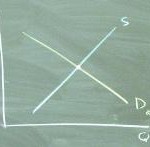The Occupy Wall Street demonstrations are lackluster at best. One troublesome aspect of the whole “movement” concerns the poor economic logic underlying their causes. The occupiers are targeting the wrong enemy when they claim corporate greed and income inequality caused by capitalism is generating the problems in Washington. These claims have been propagated by bad economics. For example, in Vanity Fair, Joseph E. Stiglitz has a rhetorically attractive but fundamentally flawed piece in support of these views. In the article, he writes:
Economists long ago tried to justify the vast inequalities that seemed so troubling in the mid-19th century—inequalities that are but a pale shadow of what we are seeing in America today. The justification they came up with was called “marginal-productivity theory.” In a nutshell, this theory associated higher incomes with higher productivity and a greater contribution to society. It is a theory that has always been cherished by the rich. Evidence for its validity, however, remains thin.
In essence, Stiglitz is claiming that the idea that labor supply curves are upward sloping is a “justification” with little evidence. In a completely different context, Krugman has claimed that an upward sloping demand curve describes our current economic situation. Both of these arguments defy the fundamental logic of basic economics.
In 1996, Nobel laureate James M. Buchanan wrote in the Wall Street Journal:
The inverse relationship between quantity demanded and price is the core proposition in economic science, which embodies the presupposition that human choice behavior is sufficiently rational to allow predictions to be made. Just as no physicist would claim that “water runs uphill,” no self-respecting economist would claim that increases in the minimum wage increase employment. Such a claim, if seriously advanced, becomes equivalent to a denial that there is even minimal scientific content in economics, and that, in consequence, economists can do nothing but write as advocates for ideological interests. Fortunately, only a handful of economists are willing to throw over the teaching of two centuries; we have not yet become a bevy of camp-following whores.
The Occupy Wall Street movement would be much improved if they stuck to the basic lessons of economics and avoided peddlers of snake oil. There are so many fallacies in the occupy wall street logic, it may take an army of good economists to dispel them. Steve Horwitz clears up the fallacy that the poor are getting poorer. Jennifer Dirmeyer explains that labor supply curves slope upwards. Aeon J. Skoble discusses how property rights benefit the poor, not just the rich. Art Carden explains basic economics and shows that economic growth and not redistribution is what generates wealth.
Despite Stiglitz’s dismissal of the argument, all ships rise in a rising tide. Basic economic logic should steer those 99% to direct their anger to the real sources of fraud, theft, and inequity.
 |
Featured Image:
GMU Undergraduate Economics Society |